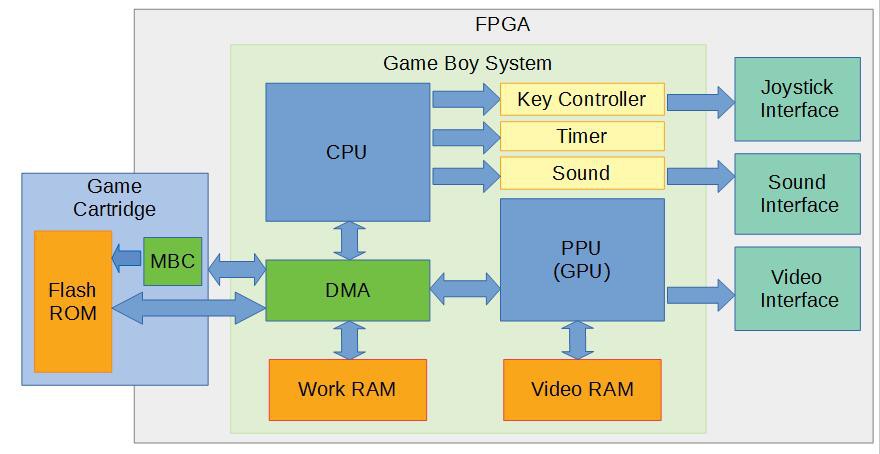Awesome
GameBoy
Coding for fun - the hard way. Trying to implement a Game Boy® compatible machine with Verilog. This is my course final project for CMPEN275 (Digital Design Laboratory) at PSU. I am trying to keep it well commented and documented.
Goals of the project
This project aims to recreate the whole Game Boy gaming system on an FPGA development board, with the ability to play commercial game like The Legend of Zelda with no major glitches.
To be specific, it should be able to run the unmodified Game Boy machine code, produce gray-scale graphics and output to an external monitor, produce the sound and output to the 3.5mm jack on the FPGA board, and accept user input to control the game. Other functionalities like serial communication and IR communication are currently not part of this project.
System Architecture
The main system architecture is designed as follows:

There are three major parts needs to be implemented: the Game Boy CPU (8-bit CISC Processor, Intel 8080 like), the PPU (or GPU), the Sound unit. Several interfacing modules are needed to support the IO capability provided by the FPGA development board. Game ROM would be stored in on-board NOR flash, and RAM would be implemented with on-chip Block RAM.
Hardware
Currently targeting on Xilinx ML505/XUPV5 and Terasic DE10-Lite.
Progress
Refactoring in progress. Previous version could run The Legend of Zelda: Link's Awakening and Pokemon Yellow with no noticable glitch.
GameBoy Related:
- CPU
- PPU
- Sound
- Timer
- Link
- Keypad
Board Related:
- DVI Interface
- AC'97 Interface
- Cartridge (Emulated with FlashROM)
- Controller Interface
Accuracy
This project is NOT built to be cycle exact accurate. Currently it does very poor on tests. Here are the results of several tests I have tried to run on it. There might be a Verilator based auto-test in the future.
Mooneye GB acceptance tests
Timer
| Test | mooneye-gb | BGB | Gambatte | Higan | MESS | VerilogBoy |
|---|---|---|---|---|---|---|
| div write | :x: | :+1: | :x: | :+1: | :+1: | :+1: (2b6360e) |
| rapid toggle | :x: | :x: | :x: | :x: | :+1: | :x: (2b6360e) |
| tim00 div trigger | :+1: | :x: | :+1: | :x: | :+1: | :x: (2b6360e) |
| tim00 | :x: | :+1: | :x: | :+1: | :+1: | :x: (a267b5b) |
| tim01 div trigger | :x: | :+1: | :x: | :x: | :+1: | :x: (a267b5b) |
| tim01 | :+1: | :+1: | :+1: | :+1: | :+1: | :x: (a267b5b) |
| tim10 div trigger | :x: | :+1: | :x: | :x: | :+1: | :x: (2b6360e) |
| tim10 | :x: | :+1: | :x: | :+1: | :+1: | NA |
| tim11 div trigger | :+1: | :x: | :x: | :x: | :+1: | NA |
| tim11 | :x: | :+1: | :x: | :+1: | :+1: | NA |
| tima reload | :x: | :x: | :x: | :x: | :+1: | :x: (a267b5b) |
| tima write reloading | :x: | :x: | :x: | :x: | :+1: | :x: (a267b5b) |
| tma write reloading | :x: | :x: | :x: | :x: | :+1: | :x: (a267b5b) |
PPU
| Test | mooneye-gb | BGB | Gambatte | Higan | MESS | VerilogBoy |
|---|---|---|---|---|---|---|
| hblank ly scx timing GS | :+1: | :x: | :x: | :x: | :+1: | :x: (a267b5b) |
| intr 1 2 timing GS | :+1: | :+1: | :+1: | :+1: | :+1: | :+1: (a267b5b) |
| intr 2 0 timing | :+1: | :+1: | :x: | :+1: | :+1: | :+1: (a267b5b) |
| intr 2 mode0 timing | :+1: | :+1: | :x: | :x: | :+1: | :+1: (a267b5b) |
| intr 2 mode3 timing | :+1: | :+1: | :x: | :x: | :+1: | :+1: (a267b5b) |
| intr 2 oam ok timing | :+1: | :+1: | :x: | :x: | :+1: | :+1: (a267b5b) |
| intr 2 mode0 timing sprites | :x: | :x: | :x: | :x: | :+1: | :x: (a267b5b) |
| lcdon timing dmgABCXmgbS | :x: | :+1: | :x: | :x: | :x: | :x: (a267b5b) |
| lcdon write timing GS | :x: | :x: | :x: | :x: | :x: | :x: (a267b5b) |
| stat irq blocking | :x: | :x: | :+1: | :x: | :+1: | :x: (a267b5b) |
| stat lyc onoff | :x: | :x: | :x: | :x: | :x: | :x: (a267b5b) |
| vblank stat intr GS | :+1: | :+1: | :x: | :+1: | :+1: | :x: (a267b5b) |
Mooneye GB manual tests
| Test | mooneye-gb | BGB | Gambatte | Higan | MESS | VerilogBoy |
|---|---|---|---|---|---|---|
| sprite priority | :+1: | :+1: | :+1: | :+1: | :x: | :+1: (a267b5b) |
Logic resource usage
Current design is using ~4K Virtex-5 Slice LUTs, or ~7K logic cell rating.
How to use
See INSTALL.md
Acknowledge
This project reused codes from several other projects. A great thanks to their efforts!
These projects are used as references. Again, thanks for sharing.
Legalese
I'm not affiliated with Nintendo in any way. Game Boy® is a registered trademark by Nintendo. Nintendo® is a registered trademark. All other trademarks are property of their respective owner.
License
The Game Boy® boot ROM code is copyrighted material and intellectual properity of Nintendo®. It is provided solely for educational purpose only.
The GB-Z80 cpu code (cpu.v, cpu.vh, alu.v, and regfile.v) is originally written by Joseph Carlos, and according to his requirement, this files should only be used for non-commercial purpose.
All other software codes are licensed under MPL 2.0.
All other HDL codes are licensed under OHDL 1.0.
All other text documents are licensed under CC BY-SA 4.0